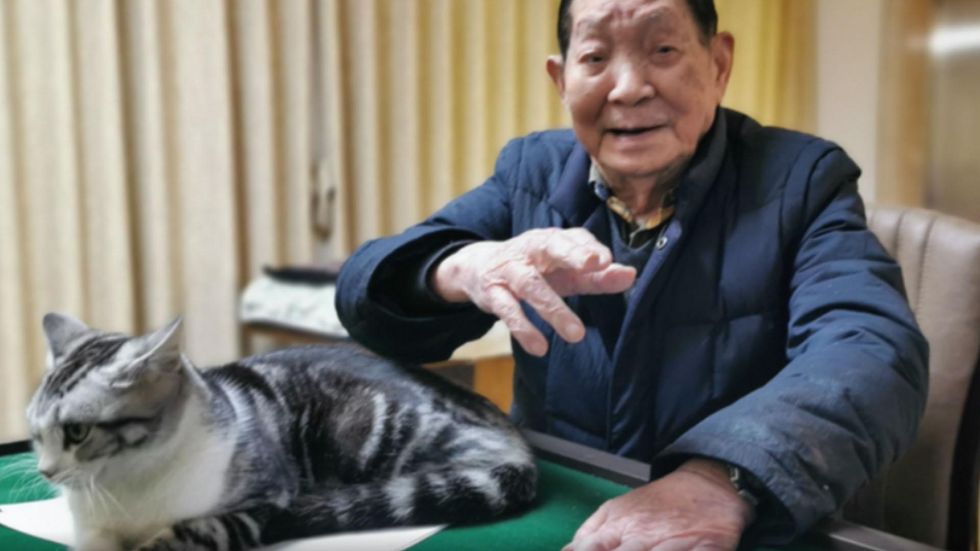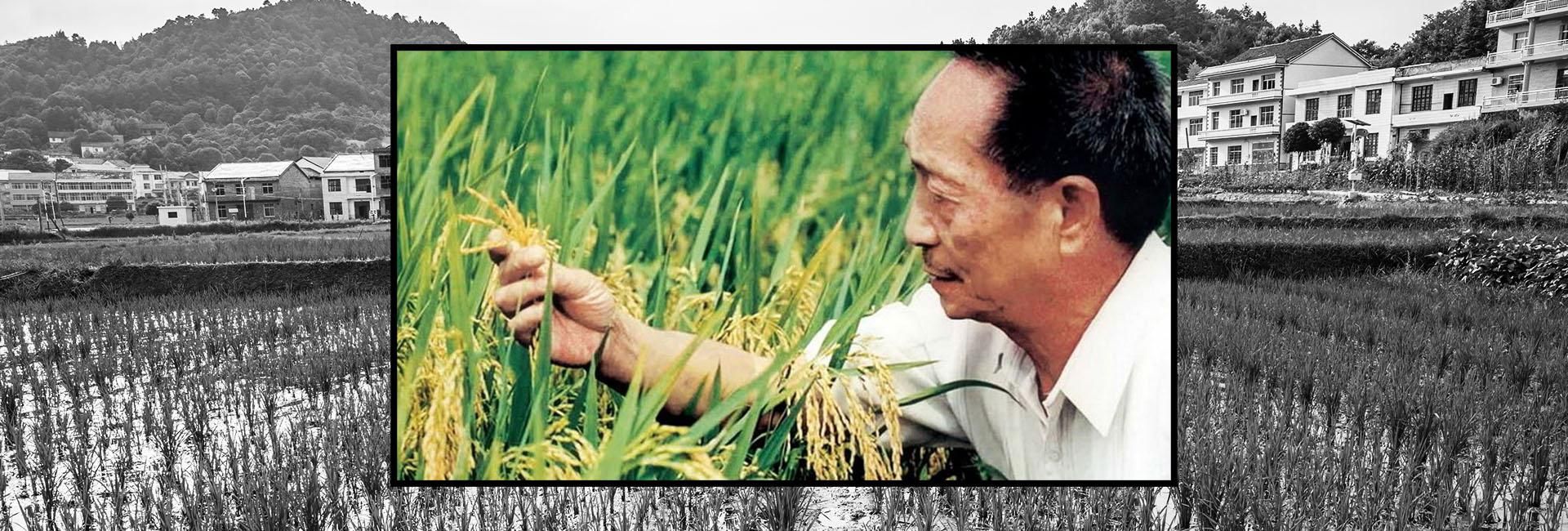On World Food Day, a tribute to the 'father of hybrid rice', a man who pursued his dream of a hunger-free world until his death at 91.
"I feel I lost my grandpa. The harsh reality keeps reminding me that he's gone ... I just cannot stop my tears," said Qiao, a 23-year-old who had just started his first job.
The day, May 22, 2021, was declared a day of national sorrow for all Chinese people because Yuan Longping, an agronomist known as "the father of hybrid rice", the man credited with lifting Chinese people out of famine, had died at 91. It was not only the older generations, who had endured those days of starvation, who grieved. The younger generations also mourned. To them, he was an important figure from their textbooks. Every Chinese school child knew the picture of Yuan with his bright eyes focussed on the rice panicles in his hand, a gentle smile on his wrinkled face.
Yuan's research changed the lives of the post-war generation of Chinese farmers whose existence had been dominated by the hardship of crop cultivation and constant hunger. As they grew older and life improved, they held on to the idea of saving food and the value the working hard and passed it on as a family tradition to their children and their grandchildren (the millennial generation). They also passed on the story of how one man, Yuan Longping, changed their lives.
I remember, as a five-year-old, being instructed to finish the last grain of rice in my bowl during lunch. My grandma would say: "You have no idea how much time and effort it takes a farmer to grow crops. In the old time we never had enough rice for a meal."
"But now, it's not a problem?" I asked. "Yeah, because of Yuan Longping," she would reply. That's how many of my generation heard the name for the first time.
'I thought he was just a historical figure in the textbook. It never occurs to me that he is still working for higher production ... for the better life of the people whom he'd never seen before.'
The memories of the older generation are not overstating the gravity of the food shortage at the time. In the early 1960s, drought, combined with a deterioration in China-Soviet relations and an old-fashioned approach to agricultural production, saw China engulfed by a national famine. National crop production in 1960 was 140 million tons, a 30 per cent reduction on the previous year.
The Chinese film Roaring Across the Horizon, set in the early 1960s, which tells the story of China's first group of nuclear scientists, references the food crisis at the time. Scientists were prioritised for food supply yet even then, the movie depicts them eating soup made with tree leaves with steamed buns.
The scene might be a little dramatised, but eating tree leaves as food was a reality for many. According to my grandma, the only way to cope with the reduction in food was to control your food consumption. She said they would survive by stretching one day's ration across three days. Food was also prioritised within the family. "Your grandfather was the major work force in the family, so he enjoyed the priority, while the rest of the family had to stand with hunger."
She said in her village, agricultural production was relatively good. "We were spared from [eating tree leaves]. We could feed ourselves with some wheat, but it was barely enough. Being hungry was the norm in that time."
In such desperate times, Yuan's crossbred rice provided the light at the end of tunnel. Mention his name and my grandma, who did not finish primary school, expresses gratitude, even though she does not understand the genetic mechanism behind his development of hybrid crops.
In the 1960s, the challenge of how to feed a nation with one-fifth of the world's population was a question haunting the mind of every Chinese agronomist. While the end of the famine was achieved through the concerted efforts of many scientific researchers in China, no one can deny Yuan's great contribution to the process. He started his research using the Soviet model, which emphasised the influence of the environment on crop production and dismissed the concept of genetic inheritance. Genetic theory was demonised as an "unrealistic capitalist theory".
He had little to show for three years of research, underpinned by Soviet teaching. Then, in 1962, the Nobel Prize for Physiology or Medicine recognised the discovery of the molecular structure of DNA.
Based on these findings, Yuan worked on his own thesis of plant DNA structure which he published in 1966. His new research coincided with the deterioration of China-Soviet relations, so his paper, which stepped outside the Soviet sphere to consider the "unrealistic capitalist theory" of genetics, was recognised and received national support.
He had developed a theory for producing a hybrid rice but now had to find the right breed of rice. In his search, his footprints covered almost every field in the country, until finally, in the 1970s, he found a single stretch of wild rice beside a railway line in Hainan province, southern China. The rice strain's high resistance to humidity and insects made it a perfect candidate for his research.

Identifying the wild rice was just the start, next it needed to be domesticated. A young agronomy student who worked on the project described the work years later. "I worked with my tutor in the field, usually under burning sunlight. Our work was to fertilise the several types of rice. No modern technology was employed, [you used] your hands and eyes," said Tang Cuyuyuyu on Chinese video blog site Bilbili. "The rice flavours were too fine to be seen easily. Our eyes turned sour quickly during the work. It's not work to be done overnight. Numerous trials and errors, which took a decade or so, are necessary before you get the right one."
When Yuan had the optimum hybrid rice breed, his next challenge was to win over the farmers. For them, a hybrid crop was nothing but a grandiloquent fairy tale. They frequently invaded Yuan's experiment fields to harvest the crops. In their eyes, protecting the hybrid crop was a waste of time, a fantasy for an uncertain future, while the crops in the test field were something they could use to put a meal on the table now.
Despite his breakthrough with hybrid rice, scepticism remained about his ground-breaking work. He was targeted for his research and his personal life. To the initially sceptical farmers, who had benefited in the intervening decades with greatly improved harvests, he had become a saviour. However, to conspiracists, he was a demon who was carrying out a vicious plan via his genetic crops. More than a decade ago, a widespread conspiracy circulated that transgenics and other genetic technologies were tools of the authorities to control and damage people's health.
When Yuan was pictured at a luxury car exhibition in 2008, examining a Mercedes Benz, new rumours bubbled up. Although he didn't buy the car, he was accused by netizens of spending national funds on personal enjoyment, while his supporters defended him by saying Yuan could have been a billionaire had he claimed intellectual property on his work.
Yuan claimed never to be concerned by these public controversies, rather he wanted to stay focussed on his life's work, to boost China's food production. In 2016, at 86, he made another breakthrough, this time in the cultivation of sea rice. In an interview with CCTV, he explained he was a "greedy" person. "Like an entrepreneur who never stops chasing for profits, I'm the one who never ceases to increase production."
In May last year, Yuan adopted a cat and named it Yuan Huahua, a common name for Chinese cats. He had hoped Huahua would help to catch mice which were always sabotaging his experiment field. However, instead of a guardian of the crops, Huahua became his loyal companion, with him at all times, in academic meetings and on daily inspections of the experiment field.
His new success in cultivating sea rice surprised and charmed the younger generation. "I thought he was just a historical figure in the textbook. It never occurs to me that he is still working for higher production," said Qiao. "He could have enjoyed his retirement as an 86-year-old man, well he's still working, for the better life of the people whom he'd never seen before."
No sooner was his legend reaffirmed for the younger generation than his story ended. So, when "Grandpa Yuan" passed away on the afternoon of May 22, just a few minutes after lunch, a nation wept. On the Weibo social media platform, tributes flowed for the man who had devoted his life to feeding the nation, with netizens saying "I've finished everything in my bowl" and noting the timing of his passing: "Even Death cannot claim his life until Yuan sees all the people finish their lunch".
Grandpa Yuan is gone, but his staff at the research centre say Huahua, his loyal companion, still makes a daily inspection of the experiment field that defined his life's achievements.
Xiao is studying a Master of Journalism and Communication degree at UNSW. He is a fan of badminton and is interested in social affairs and politics.






Afraid of an egg: the tyranny of living with social media's body standards